On a recent Monday in August, Kevito Clark hosted a video conference call to discuss the next installment of a game night he runs at the LINE LA, a hotel in Koreatown. But over the course of the hour-long meeting, he never said a word.
Instead Clark, who has a shaved head and a full beard with a touch of gray in it, used other communication tools. When the hotel’s brand manager expressed hesitation around passing out rubber bracelets, he nodded. When a collaborator mentioned the name of a tentative performer, he used Google Meet’s settings to send heart and thumbs up emojis. In between these interactions, he typed his thoughts — “Branded cups are cute,” “Any last questions?” — into the chat. Not once did he make his voice heard.
It was an unusual way to run a meeting, but Clark’s collaborators have grown accustomed to it. As he reminded the group before the call began, he is currently living out a three month vow of silence.
Across religions, vows of silence are used to quiet the mind, develop self-knowledge and connect more deeply with the divine. They tend to conjure images of monks meditating in the mountains or ascetics living in desert caves. Clark, who is 41 and lives in Leimert Park, has added a modern-day twist to the practice. Throughout the duration of his vow, which began on June 1, he has continued to live his everyday life, throwing parties, volunteering, attending concerts and even going on the occasional date.
His is a vow of silence that applies only to speaking, which means he’s still texting, emailing and typing into the chat on video calls. In person, he communicates by typing messages into the iMessage app on his phone or writing in one of the pocket-sized notebooks he takes with him everywhere.
“As the saying goes, ‘What you don’t change, you choose.’ This vow was for me to grow, not for views or likes.”
— Leimert Park resident and entrepreneur Kevito Clark on his three-month vow of silence
When he’s out in public he wears a red and blue button that reads: “Silent By Choice. Thanks for your understanding. I can talk via Text notes.” A similar message is written in marker on the front page of each of his notepads:
“Buenos Dias! Hi! Hello! My name is Kevito! Nice to meet you. I’m currently on a vow of silence. I can talk via text, chat, and this notepad. (Thanks for your understanding!)
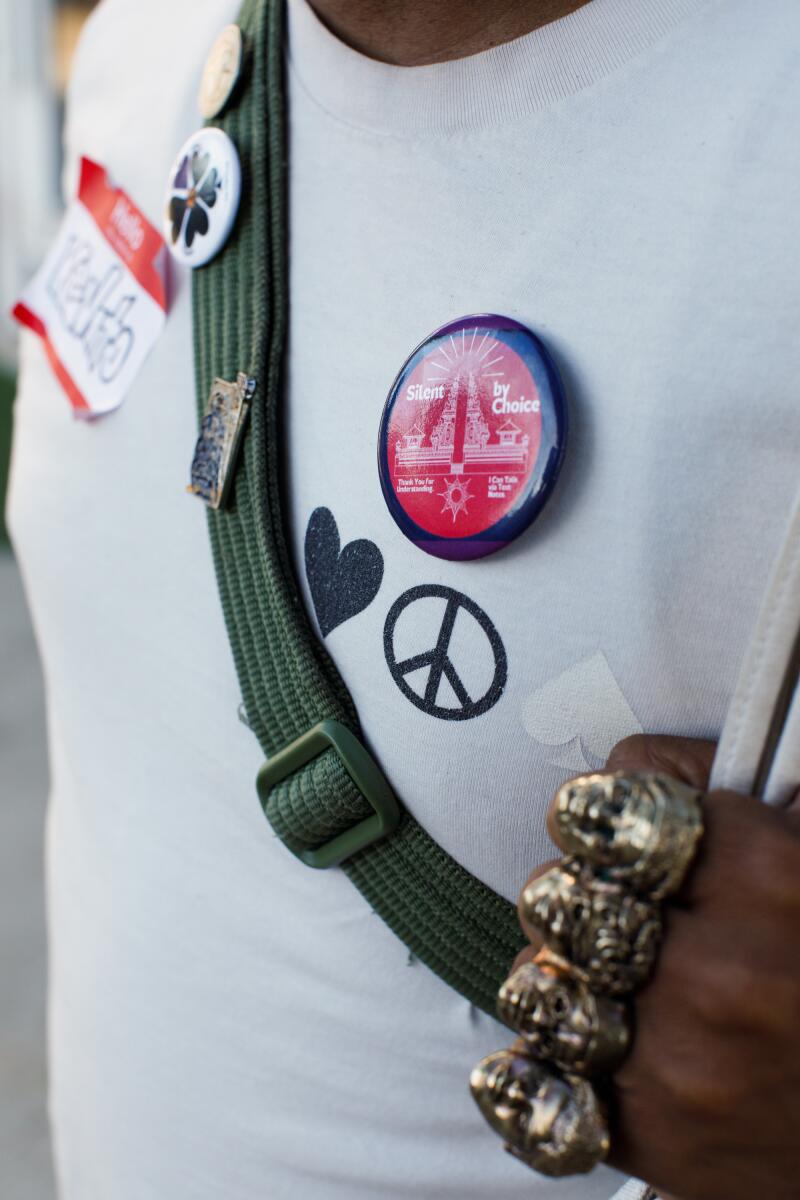
Clark wears a pin that states “silent by choice,” while practicing his vow of silence. (Carlin Stiehl / For the Times)
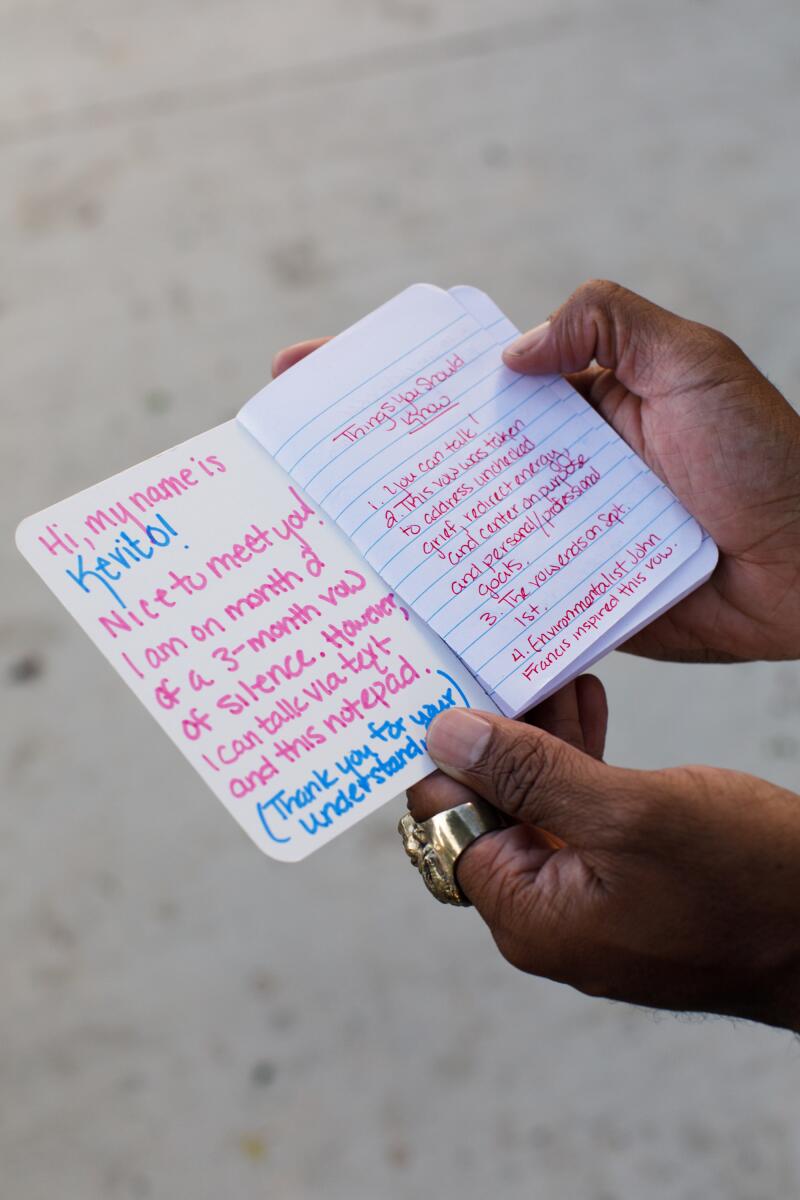
Kevito Clark holds a notepad he uses to communicate with people that has pre-written pages explaining why he’s chosen not to speak for three months.
On the following pages he keeps pre-written answers to four questions he’s most frequently asked:
- You can talk!
- This was taken to address unchecked grief, redirect energy and center on my purpose and personal/professional goals.
- The vow ends Sept. 1, 2024.
- Environmentalist John Francis inspired this vow.
Clark, who arrived in L.A. in 2022 by way of New York and Ohio, has built his life on the power of intention. His decision to go quiet in an era where so many people spend their free time speaking to front-facing phone cameras, and in a city where the squeakiest wheels get the grease, is in service of his broader ambitions. Before his vow started, he was living out what he calls “444,” which is shorthand for his aim to consistently engage with “four acts of volunteering, four acts of self-care and four ways to show up and show out for others.” His recent vow has allowed him to commit more firmly to this goal.
“As the saying goes, ‘What you don’t change, you choose,’ ” he wrote. “This vow was for me to grow, not for views or likes.”
Still, it hasn’t always been easy to integrate silence into his day-to-day schedule. Clark often works in positions where the word “communication” is in his job title. He’s the founder and chief creative officer of Love, Peace & Spades which has a monthly residency at the LINE LA, and he currently does event services for a security company and serves as a community liaison for the non-profit Black Men Hike, all while refraining from speech.
There have been business owners and collaborators who said they wouldn’t work with him until his vow is finished. And while he had fun taking a date on a choose-your-own adventure experience through Mickalene Thomas’ All About Love exhibit at the Broad, she said she would only see him again when she could hear his voice.
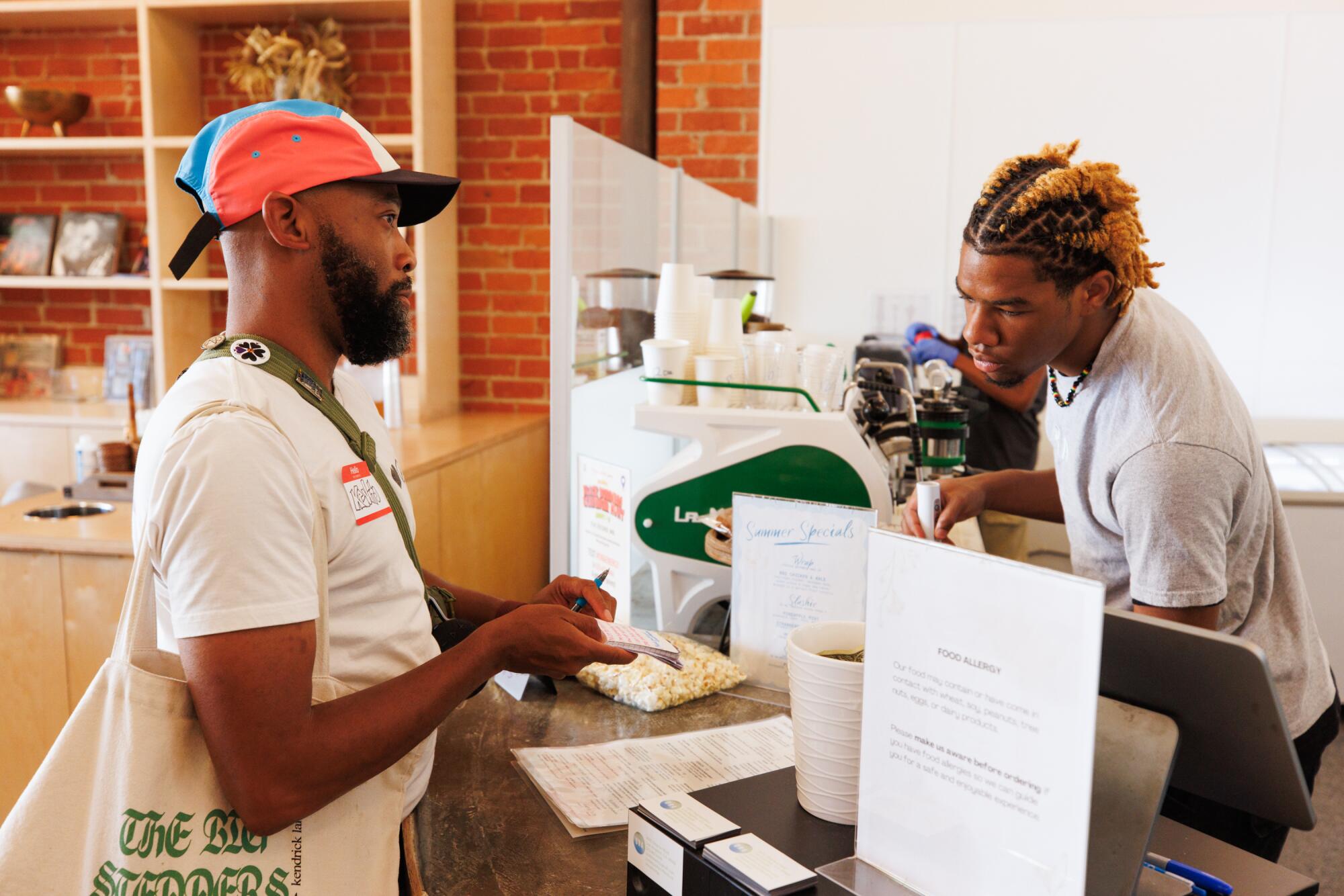
Kevito Clark uses a notepad to communicate with Kimoni Oliver, a barista at ORA.
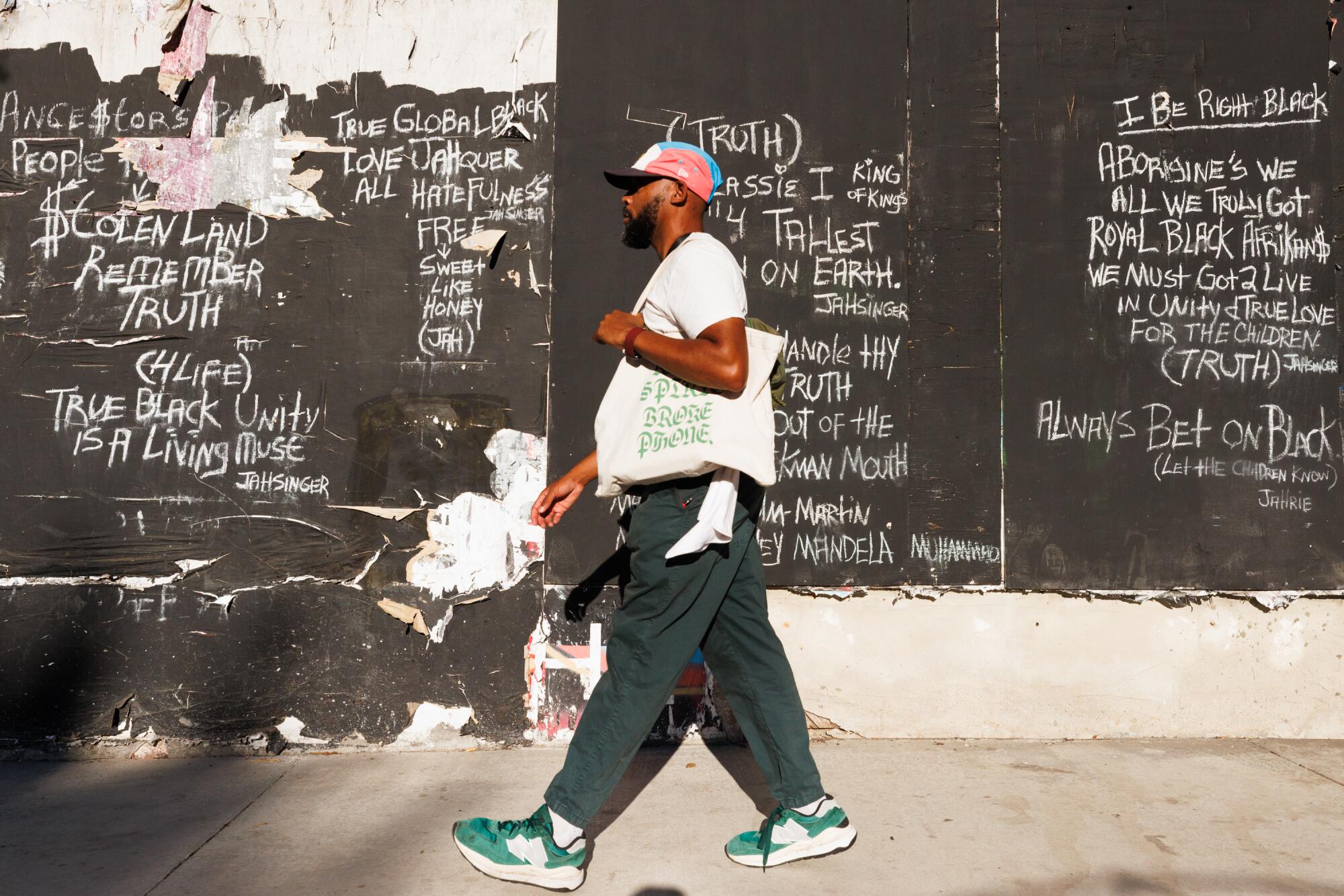
Kevito Clark walks through the streets of Leimert Park.
“I experienced how people will come to their conclusions, make assumptions (e.g., believe I have a disability),” he wrote in an email. “It takes a lot of work, patience, understanding and agreement by all parties for it to happen.”
There is no single reason that Clark took his three-month vow of silence, instead, he says a series of events catalyzed the decision. His kidneys failed in 2012 and he waited six years for a new one before a friend stepped up with a donation in 2018. Earlier this year, he mourned the back-to-back losses of two longtime friends and mentors who were like second parents to him. In the wake of their passings and the ensuing anniversaries of the deaths of other people he loved, he realized that he hadn’t made time to honor life’s transitions.
He started to ask himself, “Who are you when no one is looking?” He wondered if taking a vow of silence might provide an answer.
“It appeared like a whisper,” he wrote. “And the whisper grew into a voice.”
Online research led him to the story of John Francis, a Black environmentalist who stopped talking and riding in motorized vehicles for 17 years after witnessing two oil tankers collide and dump half a million gallons of oil into the San Francisco Bay in 1971. In a popular Ted Talk, Francis said when he decided to stop talking he found he was better able to hear others — rather than formulating a response while they were talking.
“It was a very moving experience,” Francis says in the talk. “For the first time in a long time, I began listening.”
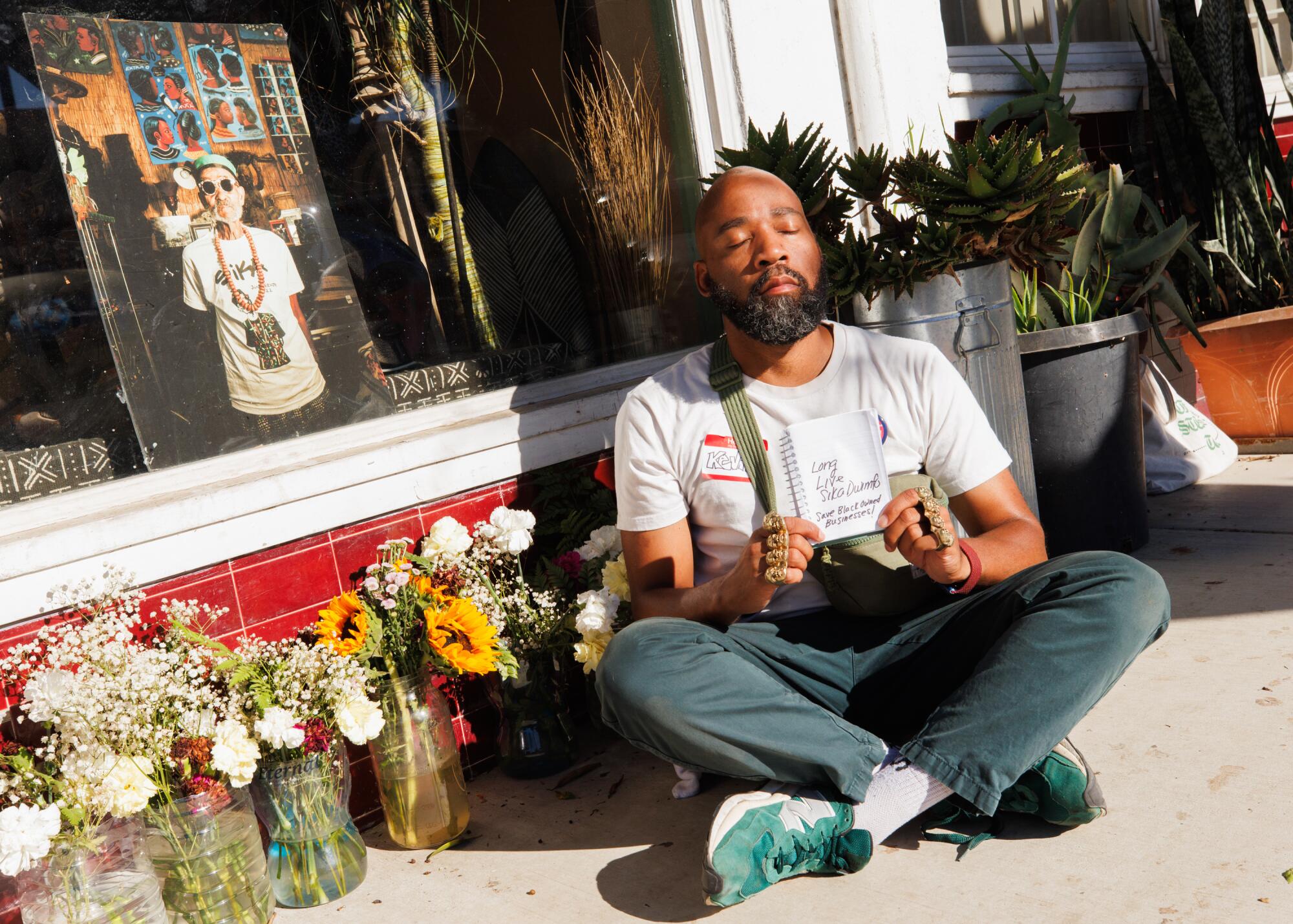
Clark was inspired by his story. “In him I saw someone who was not only curious about himself but about how to implement positive change through discipline and facing adversity,” Clark wrote.
At the end of April, Clark began to formulate a plan to take his own, much shorter vow of silence.
He chose the time period of June 1 to Sept. 1 for his vow after reading that it takes 21 days to break habits and 30 days to begin new habits. He crafted an email explaining his decision and sent it to friends, family and collaborators describing what he was about to embark on. He could still communicate, he wrote, but only through non-speaking platforms like Google Meet, mobile text and handwritten notes.
Friends and collaborators were mostly supportive and intrigued.
“He’s a laid back, calm, cool collected dude,” said Courtney La Prince, a digital designer who met Clark while volunteering at Love, Peace & Spades. “He is really careful with his words, so when he said he was going to take a vow of silence it wasn’t hard for me to imagine.”
It has also been an adjustment for those he regularly interacts with. Conversations move at a different pace when one person is typing out their responses.
“I’ve found I need to be stationary when I talk to him,” said Kelli Boyt, who also goes by DJ Kaaos Jones. “I do a lot of my calls from the car, but I need to be in tune with whatever conversation we’re having on text messages, so I almost have to plan it out. So I’ll be in the office or sitting still in my car in the parking lot.”
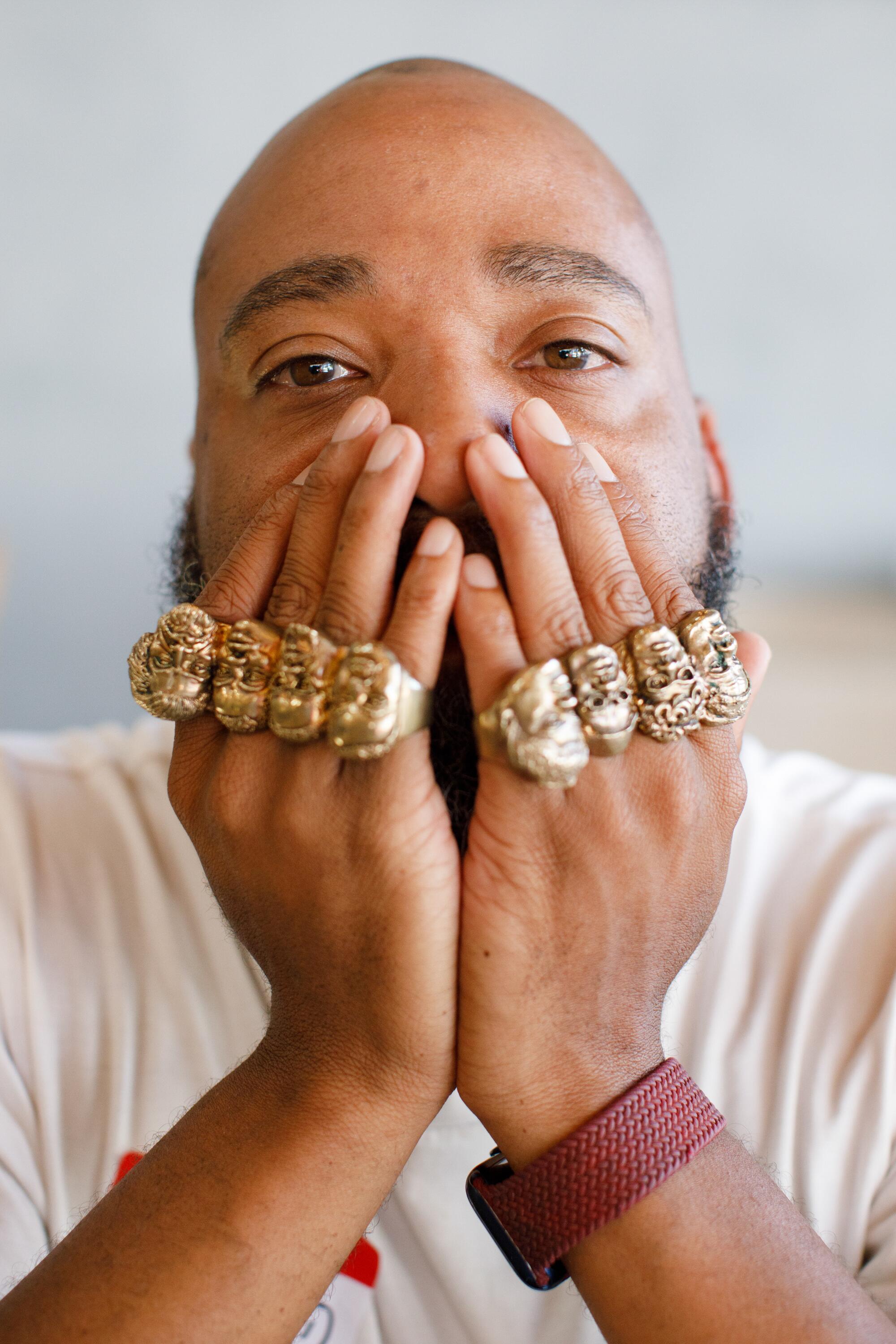
Kevito Clark at ORA in Leimert Park.
Jennie Wright, regional brand manager at the LINE LA where Clark hosts Love, Peace & Spades was initially worried about the logistical implications of his vow. She and Clark grew the event together and she didn’t know how he would run it if he couldn’t talk. At the same time, she wanted to respect his decision to focus on himself.
“He took this vow of silence to center himself and find some peace within himself, so I was like, ‘Let me take my selfishness back,’ ” she said.
Over the past three months she discovered that throwing events with a silent partner isn’t as difficult as she thought.
“We’ve continued to have Love, Peace & Spades from June and they have all run successfully,” she said. “And it pushed me to step up and become more of a leader.”
As Clark approaches the end of the vow on Sept. 1, he reflected on its impact in a written interview.
“I learned to temper my thoughts, embrace gratefulness, give myself grace, pour into myself to be available for others and magnetize the positive into manifested results,” he wrote.
Still, he’s looking forward to it ending. Love, Peace & Spades is hosting its first culture and games fest on Sept. 21. He can’t wait to talk at the event. But looking back at the past three months, he said his silent vow felt more freeing than restrictive.
“I hugged deeply. I laughed heartily,” he wrote in a Zoom chat. “Those are sincere ways to communicate whether you’re speaking or not.”





